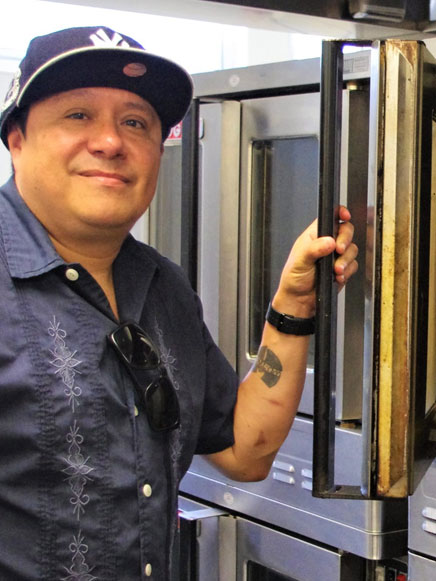
SUCCESS STORY: MIGUEL ESCOBEDO FINDS A TASTE FOR COOKING
April 24, 2018, Providence, RI — Preparing rice and beans, tapas, pasta, and his beloved garlic-flavored mashed plantains, known as mofongo, is a matter of pride for Miguel Escobedo. “This food is full of memories for me,” he said. “This is real Dominican food.”
Escobedo feels right at home behind the line at a restaurant, and is happy cooking dishes of all nationalities. Escobedo works at Francesca’s On Pawtucket, an early morning to late afternoon restaurant serving Mexican and American food. The recently introduced menu has gotten rave reviews for its fresh, gluten-free and Spanish options.
“I’ve always loved to cook, I just never thought of it as an option for me,” said Escobedo. “But I love what I do here. When you see the look on the customer’s face, it makes all the difference. And then they take pictures of the food! I love that. That’s my thing. That makes my day.”
Escobedo recently finished a 16-week Culinary Education Program at Amos House, one of the leading social services agencies in Rhode Island. Amos House manages the largest soup kitchen in the state; provides support services to more than 15,000 people each year, and shelter for nearly 165 men, women and children each night. Amos House also offers financial literacy instruction and several workforce development and education programs to help people become independent and successful. In addition to the culinary program, Escobedo also participated in the financial literacy programs offered through the Financial Opportunity Center at Amos House.
Being a chef is a fairly new experience for Escobedo, but his new-found love of cooking grew out of a career ending accident. After falling down some stairs at work and injuring his back, he was unable to work for more than a year. After that, he only worked part-time jobs and his family began to flounder.
“My bills were piling up,” said Escobedo. “I could only work odd jobs for four years, and making ends meet was a big struggle.”
Discovering a love of cooking happened during this time and was a happy accident that he attributes to his children. “I had a lot of free time then and my kids encouraged me to cook,” he said. “They don’t like to eat what my wife cooks, so it might have been out of desperation, but it worked out for everyone,” he says with a laugh. “She does a lot for the family, but she doesn’t like to cook.”
Even his wife was pleased with his cooking, but she realized that a training program might help to make this hobby into a career.
“My wife told me to check out Amos House but I thought it was just a homeless shelter,” he said. “When I came here, I thought, ‘whoa, this is different.’ There are all kinds of great programs.”
The Culinary Education Program at Amos House is just one of the programs supported by the State’s SNAP Employment and Training (SNAP E&T) program, administered by the Local Initiatives Support Corporation of Rhode Island (LISC RI). The program is designed to provide SNAP recipients with training, education and supports to help them successfully prepare for, and enter the workforce. LISC RI contracts with organizations across the state to offer a wide range of opportunities for SNAP participants including skills training that can lead to industry-recognized credentials, as well as adult education for all levels.
Depending on the needs of each participant, supports, education and training are layered to create a solution that helps prepare people for success. For Escobedo, the financial literacy part of the culinary training program was a critical component.
“From the very beginning, I was saving,” says Escobedo. “It was slow at the start but now I have savings! The financial advisor really helped with that.” Escobedo participated in financial literacy classes and one-on-one coaching services offered through LISC’s Financial Opportunities Center conducted in partnership with Amos House. All training programs offered through Amos House have the option of adding on financial literacy programs as well.
The culinary program is geared toward people who are looking for entry-level work in restaurants or other hospitality positions. In all, more than 500 adults have graduated from training programs at Amos House since the program started in 2011.
“Participants can get jobs as prep cooks, dishwashers, or line cooks, and they receive five certifications, including National ServSafe,” says Jennifer Kodis, Coordinator of Employment Programs at Amos House. The programs at Amos House are open to both SNAP recipients and non-recipients.
Building confidence is also an important key to success. “I was really scared in the beginning, but they prepare you so well,” said Escobedo. “They tell you you’re going to hear a lot of ‘no’s’, but it’s up to you to keep pressing. We learn here that we’ve got to work harder than anyone else.”
Michelle Pugh, Director of Culinary Programs at Amos House, says the course builds confidence and provides important essential qualifications, but it really exists to help participants answer a fundamental question: “Why aren’t people thriving and how can we help them? We want to find out where their passions are within the wide hospitality market in Rhode Island.”
Escobedo is a great example of that. He learned the importance of food safety and health department regulations, developed confidence and learned key financial practices that will help make him secure. But he also developed an appreciation for the craft of the culinary world.
“I have learned a lot about the presentation of food in this program,” said Escobedo, who got his job shortly after graduation. “You can’t just throw rice and beans on a plate and put a piece of protein on top. Not if you want them to really enjoy what they’re eating, or even stop to take a photograph!”